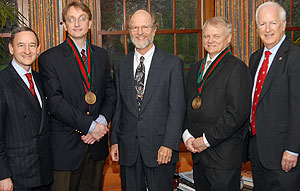The first two endowed professorships created as a component of the University’s BioMed 21 initiative have been filled.
Gary Stormo, Ph.D., professor of genetics, was installed as the Joseph Erlanger Professor, and Clay F. Semenkovich, M.D., professor of medicine, was installed as the Herbert S. Gasser Professor earlier this month.

Stormo, director of the Computational Biology Graduate Program, specializes in analyzing how genes are turned on and off in different types of normal and diseased cells. Semenkovich, chief of the Division of Endocrinology, Metabolism and Lipid Research, studies connections between diabetes, obesity, insulin resistance and heart disease.
Endowments for the two chairs, and for two additional BioMed 21 chairs that have not yet been filled, came from John F. McDonnell, vice chairman of the Board of Trustees, and the JSM Charitable Trust Foundation.
“These are two outstanding faculty members whose interests and activities embrace the intended scope and ambition of BioMed 21, so it’s very fitting that they became the first to hold BioMed 21 chairs,” said Jeffrey Gordon, M.D., director of the Center for Genome Sciences.
Stormo, whose work centers on computerized analyses of DNA sequences, exemplifies BioMed 21’s commitment to individuals who are able to work at the interface between the physical/computational sciences and biomedicine.
Semenkovich, who has active programs in both basic and clinical research, reflects BioMed 21’s goal of putting insights gained in basic studies to use in clinical settings, a process often referred to as bench-to-bedside or translational research.
Both are noted for being involved in multiple collaborations with other faculty members in their own and other departments, another goal of BioMed 21, which views future research and education related to the life sciences in a University-wide context.
“Since he came here in 1999, Gary has published papers with 15 different faculty members in 11 different departments on both the Medical and Hilltop campuses,” said Mark Johnston, Ph.D., director of the Department of Genetics.
“They both epitomize the spirit of Washington University,” Gordon added. “They’re highly creative, innovative scientists as well as generous, kind, thoughtful and highly supportive human beings. Through force of their remarkable intellects and because of their personalities, they have been able to unite faculty from multiple disciplines so that they can work together to attack and solve important questions.”
The new chairs are named for University faculty members who won the Nobel Prize in physiology or medicine in 1944 for their studies of the different functions of single nerve fibers. Erlanger was the chairman of the physiology department at the medical school; Gasser was a former student of Erlanger who came to join him on the faculty and later became head of the pharmacology department at the medical school.